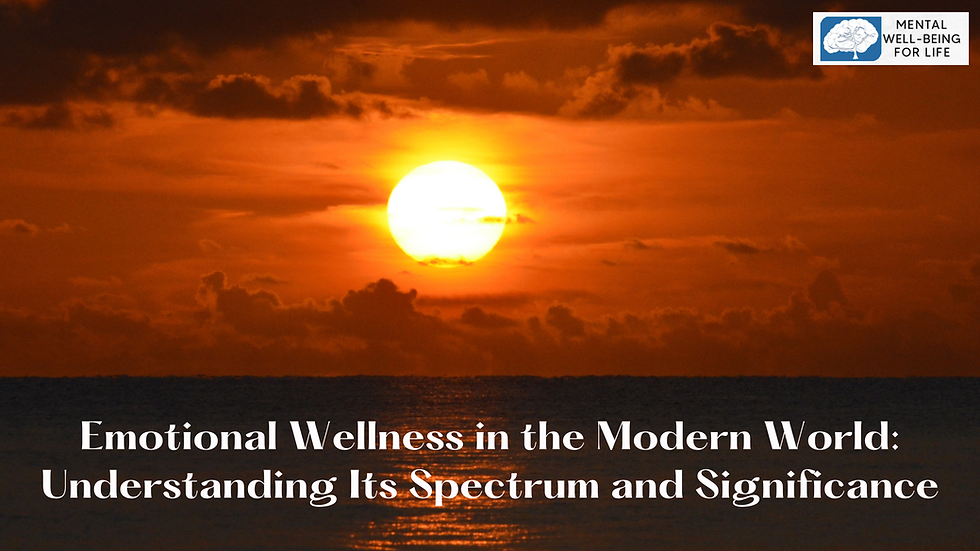Emotional Wellness in the Modern World: Understanding Its Spectrum and Significance
- Mike Pascoe

- Oct 11, 2023
- 3 min read
Updated: Oct 27, 2023

Navigating the complexities of emotional health in today's rapidly changing world is essential. As discussions around mental health become more prevalent, terms like wellness, well-being, and emotional wellness often arise, and though they may sound similar, each carries its unique meaning. This article seeks to shed light on emotional wellness, emphasizing its significance and its relationship with the broader concepts of wellness and well-being.
Defining Emotional Wellness
Emotional wellness is about recognizing, understanding, and effectively managing our emotions. It encompasses feeling in control of reactions to life's challenges and not being overwhelmed by emotions, be it stress, sadness, joy, or anger. People with a strong sense of emotional wellness are adept at navigating life's ups and downs.
Core Components of Emotional Wellness:
Emotional Awareness: Identifying and understanding feelings as they occur.
Empathy: Connecting with and understanding the emotions of others.
Resilience: Recovering quickly from setbacks and effectively managing challenges.
Self-regulation: Skillfully controlling intense emotions without suppressing them.
Optimism: Maintaining a positive view of life, hopeful of positive outcomes.
Decoding Terminology
Wellness: This term indicates a proactive approach to achieving a healthy and fulfilling life. It considers physical, emotional, intellectual, and spiritual aspects.
Well-being: Represents a comprehensive state of balance, encompassing mental, physical, and social aspects. It reflects a life infused with purpose, contentment, and strong relationships.
Mental Well-being: Focuses on the emotional and psychological facets of well-being, highlighting the importance of emotional expression, strong relationships, and a purposeful existence.
Mental Wellness: A proactive approach to maintaining mental health. This might involve activities like therapy, meditation, and mindfulness exercises.
Emotional Well-being: A broader concept than emotional wellness, it encompasses a sense of overall life satisfaction and balance, going beyond just managing emotions.
Mental Health: Central to our emotional and cognitive well-being, it dictates how we think, feel, and act daily. It is both a state and an active pursuit, integral to our overall wellness and well-being.
Well-being Vs. Wellness Vs. Mental Health
Well-being represents a holistic state of contentment and balance in various life aspects. In contrast, wellness signifies the active efforts we undertake to achieve a healthy and fulfilling life. Mental health zeroes in on our emotional and psychological states, detailing our capacity to handle stress, work productively, and contribute positively to our communities.
Organizations and Emotional Wellness:
Promoting emotional wellness benefits not just individuals but also entire organizations. Employees in good emotional health are often more productive and creative, and they exhibit resilience against burnout. To foster such a conducive environment, organizations can:
Offer Flexible Work Options: Adjustable hours or remote working options can promote work-life harmony.
Prioritize Mental Health: Provide days off focused on mental well-being to reduce stress and burnout.
Support Services: Consider Employee Assistance Programs (EAPs) that offer free or subsidized counselling.
Nurture Open Communication: Create an environment where employees can share concerns without fear.
Train Leaders: Equip managers to identify signs of emotional distress and respond with understanding.
Initiate Wellness Programs: Encourage activities centered on meditation, mindfulness, and stress reduction.
Encourage Team Bonding: Foster camaraderie through team-building activities.
Feedback Mechanisms: Implement regular check-ins on emotional wellness, addressing concerns and refining policies accordingly.
The Importance of Emotional Wellness
In today's world, filled with information overload and myriad stresses, nurturing our emotional wellness is pivotal. It influences not just our personal happiness but also our physical health, work output, relationships, and overall life contentment. Embracing emotional wellness means equipping ourselves with the necessary tools and insights to face life's challenges head-on.
Understanding the nuances between terms like wellness, well-being, and mental health is crucial for holistic self-awareness. Recognizing their distinctions and interconnectedness enables us to take better care of ourselves and others around us. As the conversation around mental and emotional health grows, it becomes ever more essential to prioritize and promote emotional wellness in both personal and professional spaces.




Comments